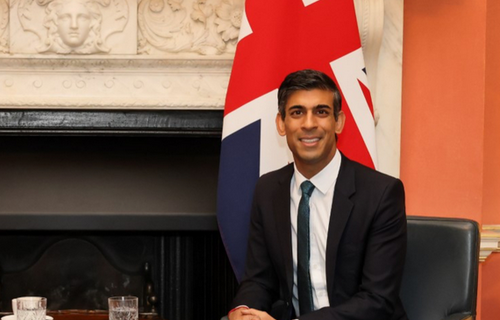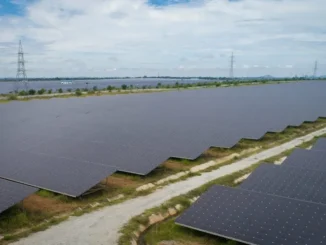
Authored by Rupert Darwall via The Epoch Times (emphasis ours),
Politicians and climate activists portray net zero climate policies as a win-win: good for the planet, good for the economy. A recent example is “Mission Zero,” a supposedly independent review of Britain’s net zero target led by the former minister who signed net zero into law. “Net zero is the economic opportunity of the 21st century,” it breathlessly proclaims. “We must act decisively to seize the opportunities in a global race.” Economics isn’t about races or moon shots but about comparative advantage and allocative efficiency. Nonetheless, the message we’re given is that the faster an economy decarbonizes, the wealthier it becomes. Through green alchemy, costs are transmuted into benefits.
In Britain, this is known as cakeism, defined by the Cambridge dictionary as “the wish to have or do two good things at the same time when this is impossible.” Normally, economists would deride such thinking. The concept of opportunity cost says that the cost of choosing one thing is represented by the highest-value option of what is not chosen. But when it comes to climate, to adapt Richard Nixon, “We’re all cakeists now” – and that includes economists, at least when it comes to their public pronouncements.
That may finally be changing. Writing in the Financial Times last week, former chief economist at the IMF and Harvard professor Kenneth Rogoff says that a factor pushing up long-term real interest rates is “the massive costs of the green transition.” In any field other than climate, this wouldn’t be news. The trade-off involved in climate policy is higher costs in the near term for a better climate some decades in the future. Thus climate policy makes us poorer (the cost) than we would otherwise be for the sake of a better future (the benefit). Politicians pushing action on climate aren’t going to admit this, but one might expect better of economists. Instead, much of the economics profession has been complicit in the spinning of this fairy tale and has forsaken the tools of its science to disabuse politicians and the public of the net zero goldilocks story.
Following the first oil price shock of the 1970s, the International Energy Agency (the IEA) was created to protect the interests of Western energy consumers. When it sketches out various policy scenarios – including net zero by 2050 – the IEA uses the same global growth rate as an input assumption. This practice misleads the credulous by implying that net zero has no negative impacts on economic growth. The IEA’s net zero roadmap foresees rapidly falling demand for oil, causing oil prices to drop to $35 a barrel by the end of the decade. This is fantasyland economics.
Less than two years ago, the IMF was telling governments to embark on a huge green stimulus program, amounting to one percent of GDP, to stave off “catastrophic” climate change. It was terrible advice that would have meant even higher inflation than the inflation we’re now experiencing. IMF economists have also produced misleading estimates of the scale of fossil fuel subsidies, which a 2019 paper estimated at an implausible $4.7 trillion in 2015. Dig deeper, and the definition used by the IMF for fossil fuel subsidies would include delays to EVs caused by traffic congestion and EV tire wear resulting in PM2.5 particulate pollution. Based on the IMF’s misleading definition of fossil fuel subsidies, if the world went 100 percent EV, there would still be fossil fuel “subsidies” caused by EVs stuck in traffic jams, involved in fatal accidents, and from PM2.5 pollution.
Were the IMF’s fossil fuel subsidy estimates the product of a good-faith exercise, progressively eliminating fossil fuels would throw up large and growing fiscal surpluses. That’s not what the British Treasury found in its October 2021 review of the impact of net zero on the public finances. Net zero, it reckons, results in “a large and relatively rapid structural shrinking of the tax base as motorists move away from using petrol and diesel vehicles. This leads to a significant and permanent fiscal pressure.” How come the elimination of fossil fuels doesn’t lead to the disappearance of government subsidies for fossil fuels? Far from being an objective analysis – though it’s widely quoted and cited, it’s wholly misleading – the IMF’s fossil fuel subsidy estimates are little more than IMF-branded climate propaganda.
The Treasury review concedes that Britain is unlikely to be directly affected by the physical effects of climate change. Rather, the effect is likely to be indirect via global supply chains, with reduced production pushing up the cost of imported goods. Ironically, the threat to the global trading system turns out not to be from climate change, but climate policy, such as the European Union’s carbon border adjustment mechanism (i.e., tariffs) and the United States’ Inflation Reduction Act – $370 billion of subsidies and trade privileges designed to decarbonize electricity generation. Inflation reduction? Residential electricity prices in Britain more than doubled in a decade, increasing from 8.08p (9.91?) per kWh in 2009 to 17.98p (22.04?) in 2019, thanks largely to climate policies.
In its assessment of the fiscal risks of climate change, Britain’s Office of Budget Responsibility (OBR), which plays a role similar to that of the Congressional Budget Office, uses the Intergovernmental Panel on Climate Change’s RCP8.5 scenario and its off-the-wall assumption of a six-fold growth in global per capita coal consumption to 2100, which the OBR reckons would cause public debt to explode to 289 percent by the end of the century. If climate change were all that it’s hyped up to be, there would be no need to use extreme and implausible scenarios that have lost touch with economic reality – not that you’d learn that from mainstream economists.
Stanford economist John Cochrane is a rare exception who has called out the notion that climate change represents a risk to the financial system. Economists’ colleagues in business and finance schools have shown much greater commitment to scientific objectivity. True, some business schools are seeking to close down debate, notoriously the University of Pennsylvania’s Wharton School, whose dean told RealClear Investigations that he did not see “substantive academically grounded debate” on climate financial risk. Despite the political and commercial momentum behind Environmental, Social and Governance (ESG) investing, there is debate.
In 2020, the University of California Los Angeles’s Bradford Cornell and NYU Stern School of Business’s Aswath Damodaran wrote a paper unpacking the central ESG claim of doing well by doing good. Harvard Law School’s Lucian Bebchuk and Roberto Tallarita have written articles showing that the Business Roundtable’s statement on stakeholderism is little more than a PR exercise. In 2022, London Business School’s Alex Edmans called time on ESG in a paper titled “The End of ESG,” followed by a second earlier this year applying insights from mainstream economics to test fashionable claims made for ESG investing.
By contrast, the silence of economists on the downsides of net zero climate policies for economic growth is a manifestation of intellectual cowardice. A fundamental tenet of environmentalism is hostility to economic growth. Dating back to the limits-to-growth debates of the early 1970s, environmentalism views economic growth as unsustainable and a threat to planetary boundaries (an ill-defined concept without empirical validation).
This green anti-growth sentiment is leaching into mainstream economics. A 2020 “Green Swan” paper on central banking and climate change published by the Bank for International Settlements (BIS) and the Banque de France argues that the notion of “endless economic growth” needs to be questioned, going on to suggest that biogeochemical cycles apart from the carbon cycle “may present even higher risks than climate change.”
So, on one side, we have environmentalists, including some at the Banque de France and the BIS, who believe economic growth is bad for the planet and who support net zero because it suppresses growth; on the other, we have economists touting net zero as a growth elixir or preferring silence to pointing out the awkward trade-offs inherent in it. Perhaps with Roggoff’s example before them, they will find the courage to speak up so that the public is better informed about the likely costs and consequences of net zero. As can be seen on this twentieth anniversary of the Iraq war and its nonexistent weapons of mass destruction, a policy misrepresented and deceptively sold to the public poisons democracy.
Rupert Darwall is a senior fellow of the RealClear Foundation and author of Climate-Risk Disclosure: A Flimsy Pretext for a Green Power Grab.
Loading…



